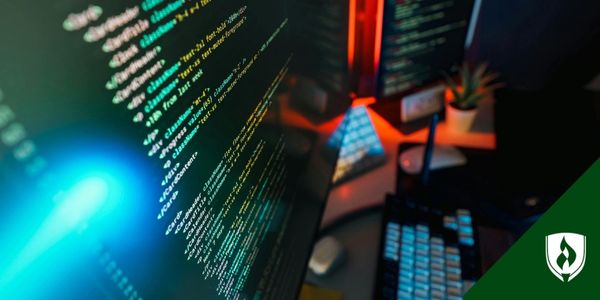
The term “cyber security” makes you think of an action movie where a team of tech-savvy pros embark on a mission to save the day from behind their computer screens. The real work of cyber security pros might not be quite that exciting, but it is still an incredibly important job in the digital age.
So what’s the real cyber security job description? “Cyber security professionals ensure the confidentiality, integrity and availability of all data across the organization,” says Greg Scott, cyber security professional and author.
There’s more to working in cyber security than meets the eye. We’re diving deep into the cyber security job description so you can determine whether you might have a future in this essential tech career.
The importance of cyber security
Cyber security is all about protecting data—but why is data such a big deal? “Every organization needs data to operate,” Scott says. Data is the foundation of business in the digital age. It includes everything from important financial information to personal medical histories to the type of cat food customers buy.
“Security is as strong as the weakest link,” says Jamie Cambell, cyber security expert and founder of consumer digital privacy website GoBestVPN. “If a billion-dollar company didn’t have proper security measures, it simply could not operate. There are too many hacking attacks.”
Cyber security professionals are the technology experts who keep hackers at bay, ideally by preventing attacks from happening in the first place. “The primary role of a cybersecurity professional is more proactive than reactive,” Cambell says. Data is growing more important as organizations across industries rely on cyber security experts to keep their data safe and secure.
Cyber security job duties
Cyber security experts juggle a variety of daily job duties to accomplish their mission of protecting data. Their most common job duties include “designing and implementing security measures—taking into account a company’s security risks—and installing, properly configuring and regularly updating security software,” says Dmitry Kurskov, director of information security at ScienceSoft. He adds that cyber security specialists are also responsible for creating a plan of action in case security breaches do occur.
These tech professionals must research new technology and stay up to date on cyber security trends, according to the Bureau of Labor Statistics (BLS).1 Cyber security specialists also actively monitor the safety of their organization’s information and conduct tests to find any weaknesses in their systems.
Working in cyber security doesn’t always mean you’ll be behind a screen, however. “Some cybersecurity professionals lean on the social side—they are less ‘technical’ and focus more on securing things on a human level,” Cambell says. This aspect of the job includes updating employees on security protocols, working to prevent a type of attack called “social engineering”—attacks that rely more on human error than technical know-how—and collaborating with company executives to create a security plan.
Cyber security work environment
Careers in cyber security can be found in nearly every industry, thanks to organizations’ widespread use of data. Although 28 percent of information security analysts work in the computer systems industry, others can be found working in finance and insurance, company management or administrative and support services, according to the BLS.1
Most cyber security workdays follow the typical 9 to 5 pattern you’ll find in many careers. That said, cyber criminals don’t exactly clock out after business hours. This means many of these tech pros may also need to be on call on nights or weekends in case of an after-hours security breach.
Cyber security skills
You might be surprised to learn that finding success in a cyber security career isn’t all about technical ability. “It’s not enough for a cybersecurity professional to be technically skilled,” Kurskov says.
Transferable skills, like communication and decision-making, are equally important. Being able to think on your feet and show good judgment are especially valuable in this field. “Security pros should always be ready to react to cyber-related incidents quickly, make hard—and preferably correct—decisions taking into consideration all security risks and potential consequences these decisions may cause,” Kurskov says.
Don’t underestimate the skills and experience you already have that could be beneficial in cyber security! We analyzed nearly 138,000 cyber security job postings to bring you the top skills real employers are looking for.
Technical skills2
- Information systems
- Network security
- Linux
- Cryptography
- Python™
- Vulnerability assessment
- UNIX
- Information assurance
- Penetration testing
- Intrusion detection
Transferable skills2
- Communication
- Collaboration
- Research
- Planning
- Problem-solving
- Writing
- Troubleshooting
- Organization
- Attention to detail
Cyber security training and education
Cyber security professionals aren’t born with the technical skills listed above. It takes specialized training and education to prepare them for the demands of the workplace. The BLS reports that most employers want to see a Bachelor’s degree in Cyber Security, computer science or another related field.1
The training doesn’t stop there, however. Thanks to the continuous development of new technology, cyber security specialists will need continuing education to keep up with best practices. Some employers want their cyber security pros to be certified, proving that they keep their skills sharp and have the specific knowledge needed on the job.
These are some of the in-demand certifications for cyber security professionals:
Certifications in demand2
- Certified Information Systems Security Professional (CISSP)™
- Certified Information Systems Auditor (CISA)™
- Certified Information Security Manager (CISM)™
- CompTIA Security+™
Secure your future
Now that you know the real details of the cyber security job description, you might be able to picture yourself working in this important tech career. Learn more about how to take your first steps in the right direction with our article “How to Become an Information Security Analyst & Fill the Gap in the Tech Field.”. Curious about what skills you need for cyber security? Check out this article.
1Bureau of Labor Statistics, U.S. Department of Labor, Occupational Outlook Handbook, [career information accessed March 1, 2019] www.bls.gov/ooh/. Information represents national, averaged data for the occupations listed and includes workers at all levels of education and experience. Employment conditions in your area may vary.
2Burning-Glass.com (137,953 cyber security job postings, Jan. 01, 2018 - Dec. 31, 2018).
Python is a registered trademark of The Python Software Foundation.
Certified Information Systems Security Professional (CISSP) is a registered trademark of (ISC)², Inc.
Certified Information Systems Auditor (CISA), Certified Information Security Manager (CISM) are registered trademarks of ISACA.
CompTIA Security+ is a registered trademark of CompTIA Properties, LLC.




